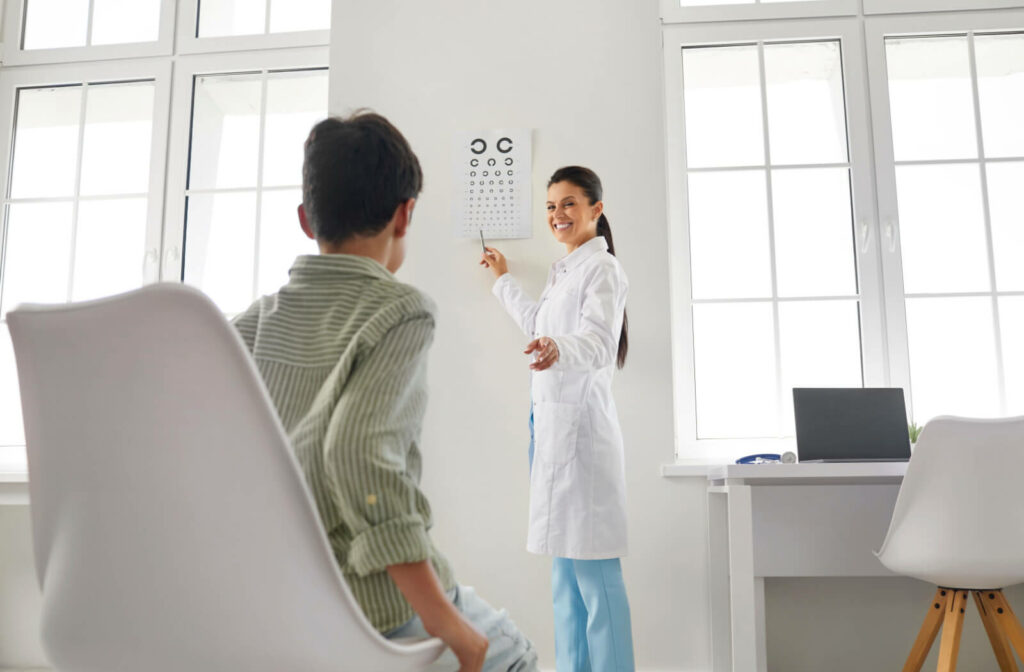Vision therapy is a term that may not be familiar to many, but it can be an incredible way to boost certain visual skills with the help of a trained optometrist or vision therapist.
Your eyes and brain work closely together, but problems can often develop with this internal system. Vision therapy aims to boost key visual skills and fix visual problems, helping you develop better communication between your eyes and brain. Each person in vision therapy receives a custom-tailored plan that is aimed to treat the weak spots in their vision and improve their overall visual abilities!
Daniel & Davis Optometry specializes in vision therapy programs, including developmental vision therapy, vision therapy for children with special needs, and neuro-rehab vision therapy.
What Is Vision Therapy?
Your eyes are an incredibly complex system. They receive information from the world around them through light rays. These rays reach the retina, where they’re sent to the optic nerve, then to the brain where they’re converted into images. The brain then uses this visual information to help you interpret your surroundings.
But sometimes, a problem can develop somewhere in this communication line. Maybe the muscles to control the eyes are having difficulty moving accurately, or maybe both your eyes aren’t focusing on the same point. Maybe the brain itself is misinterpreting this visual information and creating odd images, or your eyes aren’t properly able to switch between distances.
This is when vision therapy can be a beneficial choice. Think of it similarly to physical therapy—through a series of exercises, you can retrain your eyes and brain to work properly together. Simply put, vision therapy is designed to help the visual system correct itself.
This is achieved through a series of exercises tailored to each patient’s individual needs. These exercises are performed under the supervision of a professional vision therapist and often include additional exercises to be done at home.
What Can Vision Therapy Help With?
Vision therapy can benefit you in numerous areas. For children, it can dramatically improve learning abilities, and since most kids’ learning is vision-based, it can have a positive effect on their academic performance. Vision therapy can be particularly beneficial during these developmental years, as children’s eyes and brains have had less time to get used to poor visual habits and are slightly easier to retrain.
In fact, in these earlier years, vision therapy can even help improve eye conditions, such as:
- Strabismus (crossed eyes)
- Amblyopia (lazy eye)
- Binocular vision problems
For adults, vision therapy can enhance the ability to focus, which is especially beneficial if one’s job involves intensive visual tasks. It can improve different visual skills, like your hand-eye coordination, or teach you to quickly switch between focusing at different distances.
Vision therapy can provide you with a wide range of visual skills that can benefit your daily life, like teaching you to improve your:
- Eye movement
- Eye control
- Binocular vision
- Eye tracking (the ability to follow objects with your eyes)
- Depth perception
- Peripheral vision
It can even help improve how your brain processes this visual information, allowing you to be more efficient when reading or writing. These benefits make vision therapy an excellent way to improve your visual skills beyond what a pair of eyeglasses or contacts can do.
How Does Vision Therapy Work?
The process of vision therapy begins with a comprehensive eye exam. During this time, an optometrist will test your visual skills, ranging from your peripheral vision to your overall visual acuity.
Once they have a better understanding of your visual skills and abilities, they can create a customized treatment plan. This plan may include exercises performed in the office under doctor supervision, often supplemented with exercises done at home.
Vision therapy exercises are aimed at enhancing eye coordination and focusing abilities. They can help train the brain and eyes to work in unison more effectively. You might be provided with specialized equipment, such as:
- Corrective lenses
- Prisms
- Optical filters for your glasses
- Different boards, posters, or flashcards
What to Expect from Vision Therapy
Vision therapy isn’t a quick fix, but it can be an excellent way to address problems with your visual skills and can have an incredible impact on your life.
Think of vision therapy as a form of therapy that greatly depends on how committed a patient is to seeing it through. The outcome can take anywhere from a few weeks to a few months, and it requires dedication.
However, once the root of the vision problem is treated and not just the symptoms, the long-term benefits become apparent. If you stick with it, you can notice a significant improvement in your visual skills, which can benefit almost every part of your life.
We Offer Vision Therapy for Children with Special Needs
It’s common for children with special needs to experience underlying vision issues. At Daniel & Davis Optometry, our team of eye doctors has the experience and understanding required to accurately diagnose vision concerns in children with diverse special needs.
Vision therapy is an effective method for minimizing the difficulties they encounter in educational settings, as our eye doctors take a scientific approach to enhance your child’s ability to interpret visual information with more precision.
With a comprehensive vision therapy program, we can help improve your child’s brain-eye communication and the efficiency of their visual system.
Neuro-Optometry vs. Vision Therapy
Neuro-optometry, short for neurological optometry, concentrates on evaluating and treating visual problems that are related to neurological or brain-based issues. Vision therapy aims to address various visual problems, including those related to eye movement, eye coordination, focusing, and visual perception.
Neuro-optometrists work with patients who have experienced:
- Traumatic brain injuries
- Strokes
- Concussions
- Other neurological conditions
Our eye doctors address visual problems resulting from these conditions, such as double vision, visual field defects, and problems with eye teaming and tracking.

Where to Get Vision Therapy
If you’re interested in vision therapy, Daniel & Davis Optometry is an excellent place to start. With a team of professionals ready to guide patients through the process of vision therapy, you can start your vision therapy journey today!
Whether it’s for children struggling with learning due to visual issues or adults wanting to focus better at work, vision therapy can offer the necessary help. If you want to learn more about the benefits of vision therapy, book an appointment with us today.


